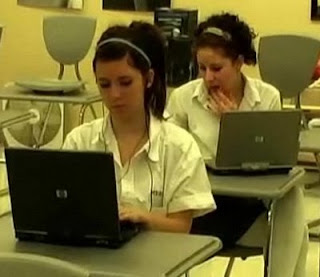
Today's post is derived from a document I have prepared for a January, 6, '09 in-service presentation:
If you are familiar with Google Docs, you were probably introduced to them for their many collaborative advantages. However, this has not been my primary use:
* Personal Notes. Since the documents are easy to access at work, home, mobile; I keep my "To Do" list and basic works in progress on Google Docs.
* Templates. Because it is so easy to revert back to the original version of the document, sometimes I create a template with Google Docs for evaluating student work. I build a simple evaluation sheet and then customize it for each student. Most recently, I required students to contrast YouTube "To Be or Not To Be" soliloquies. I critiqued their contrast papers using Google Docs.
* Slide Shows. I am no big fan of Power Point (There is nothing I hate than having a slide show read to me). HOWEVER, the Presentation application on Google Docs allows me to create simple slides, and . . . . A) Often I will find a couple of charts I want to share that day with my government class, and I will slap them into a slide show and present them conveniently to the class. B) I love the ability to create simple slide shows which I can publish to Moodle, so that if a student misses class she can still have the material. For example, check out the chapter 11 supplements for my AP text. I also have started to create multi media "quizzes using Presentation". For example, see Presidential Roles.
* Publishing to Moodle. I think one of the coolest features of Google Docs is the ability "share" by publishing as a web page. This means that you can link your Google Doc to Moodle as a web page. If you later need to update the information on the document (as I often must do for American Government) you don't need to go through the process of deleting the file from Moodle and uploading to Moodle again. This is not only a cumbersome process, but it is also difficult to keep track of which files are up to date. Here for example is a document I use in a simulation. This information must be constantly updated, and Google Docs has really helped me out, because I have several such documents for this activity.
By the way, material from the rest of my presentation may be found at Google Notebooks and Canning a Lecture with MP3s.
Please post any suggestions or reactions of your own!
